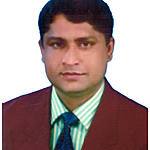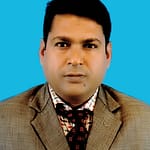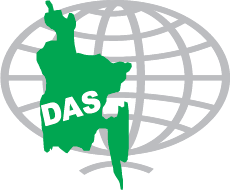Who We Are

Message from Chairman
There must be a profound reason why we from different levels strive for collective development. Our deep inters -connectedness and inter -dependence is no longer a philosophical exaggeration. Now there has been an emerging awareness that we all are organs of a gigantic body which we call human race. Unless the whole is flourished, parts can experience only momentary growth. This has been another year of sincere efforts to achieve that desired end; poverty-free just society. 2015-2016 was a phenomenal year of inspiring successes, in-depth insights and intense learning in the field of responsive governance, sustainable livelihoods and essential services, empowerment of women and underprivileged people. But one of the essential characteristics of dream is that it always stands ahead of us like the horizon. And it is good that it is always ahead because as we chase our dreams, we keep growing! This is an endless evolutionary process until we reach to perfection.
Md. Asaduzzaman
Chairman

Message from Founder & Executive Director
Development Activities of Society (DAS) was established in Jhenaidah-Bangladesh in 1998. After incorporation, the organization has completed 17 years in 2016 of its existence as non-profit social welfare organization, has rendered development and project oriented issues implementing directly or in partnership with some other government and non-governmental organizations. DAS undertakes a wide range of activities in the field of Non-Formal Education, Income Generating Activities, Human Development, Training and various social welfare activities.
The participatory approach enhances the motivation of the staff members. We also made remarks that DAS is very strict in financial management; all purchases are carefully planned, approved, recorded and checked, both by the internal financial staff as well as by external accountants. The beneficiaries are very motivated to participate in the activities run by DAS.
The report of the programs in described in these pages give you a conspicuous picture of the performance in the last tenure. We hope to rectify our vitality to achieve more in future.
In conclusion, I take the opportunity to express our sincere thanks to the Chair, Members of the Executive Committee as the General Body who acted as a catalyst with good advice and guidance to step forward throughout the year.
Abul Kalam Azad
Founder & Executive Director
Organization's overview
Type of The Organization
DAS is a non-government, non-profitable and non-political voluntary development organization.
Legal Status
Registered With | Registration no. | Date of Registration |
Micro Credit Regularity Authority (MRA) | 03016-00167-00724 | 21.08.2013 |
Directorate of Social Welfare | Jhenai-302/2001 | 13.08.2001 |
NGO Affairs Bureau | 2518 | 26.11.2009 |
Department of Youth Development | Jhenai-118/65 | 26.11.2007 |
Department of Family Planning | 241 | 12.03.2009 |
PADOR | BD-2017-ELV-2903173284 | 2017 |
— Goal
The main goal of the organization is to ensure socio-economic and cultural status of disadvantaged and nderprivileged people in their respective area.
— Objectives:
§ To capacitate the organized people through participatory training, workshop, technical skill and so that they themselves can improve their quality of life.
§ To operate adult mass literacy movement and non-formal primary education program for the illiterate men, women, working adolescent and children.
§ To provide services pre-disaster period.
§ To establish the rights of women and gender balance in the society by involving them with various IGAs like handicrafts, fish culture, micro credit, poultry etc.
§ To stand by the area people in disaster like Arsenic Pollution, Flood etc.
§ To expand livelihood channels for increasing employment the people who remain jobless in maximum time whereas they have capability to perform.
§ To rehabilitate the disabled by providing necessary PRT, Support & Services etc.
§ Create sustainable environment and ecology balanced perform.
§ Implement goal and objective related programmers as and where necessary.
§ To contribute to ensure human Rights of targeted people and good governance of targeted institution of specific region
— Our Mission
A large number of inhabitants in our society have no right of entry to essential foodstuff, health services, education, and basic rights and like other basic essentials. They are poor and underprivileged and the society itself is culpable for their distress and such situation can be improved if they are making available with mandatory co-operations. In this situation DAS has designed to cooperate with these poor and underprivileged peoples through implementing projects and programs. Mainly DAS would like to bring into being self-financed, self-employed and self-empowered communities with capabilities greater than before by providing need based services and supports like awareness raising, nutrition, health, sanitation, education, agriculture, savings, credit, marketing, gender, environment etc.
— Our Vision
Establish equity-based democratic and sustainable society which considers that underprivileged peoples are becoming poor for the reason they are the sufferers of a variety of unfair activities of social and political system. Their situation can be changed through making them robust for their preferred changes. If they are made fit for their transform, they themselves can change their fortune.
— Our Approaches
DAS perform in the course of integrated approaches focusing on resource based rural groups, raising awareness about health, hygiene and sanitation; enhancing capacity level of the distressed women; raising income level to alleviate poverty; training on technical skills; raising awareness about human rights; mobilizing community people to act against children and women repressions; training on leadership development; motivate the local people to properly utilize local natural resources and above all, uplift the social status of the rural poor. This approach is replicated in all planning and policies prepared by DAS. Approximately all the projects and programs are taken in the selected villages and slums where DAS has been carrying out its activities following this approaches.
Programmatic Approach:
· Integration of rights-based and service delivery
· Social Mobilization
· Community Based Organizations and Group Formation
· Networking and alliance building
· Policy advocacy
· Training and Awareness Generation
· Women-Youth-Child participation
· Knowledge sharing
· Stakeholders’ Participation
· Institutional Management and Capacity Building
Major Focus Areas:
· Gender and social justice
· Women’s social, political and cultural empowerment
· Prevention and protection of children and women from violence, abuse and exploitation
· Protect women and children from trafficking and promote youth to combat child trafficking
· Counter-trafficking intervention in prevention, protection and prosecution
· Strengthen the legal processes wherever require, including the protection of the victims
· Education
· Sustainable development through agricultural economy and environment
Thematic Areas :
i)Human Rights, (ii) Good Governance, and (iii)Sustainable Development and these have always guided the organization in itseveryday work. ACD has clustered its activities into three sectors and designedits programs:
Sectoral Approach | |
Human Rights Sector | ► Gender and Social Justice ►Women’s Empowerment and Leadership Development ►Combat Human Trafficking and Care and Support for the Survivors ► Civic and Human Rights Advocacy and Education |
Child Rights Sector
| ►Prevention and Protection of Children, ►Victim of Violence and at Risk Situation ► Institutional Care and Support for the Child Victims of Violence ► Empowerment and Participation of Children and Adolescents |
Sustainable Development Sector
| ►Developed and Functioning of Community based Organizations ►Institutional Management and Capacity Building ►Economic Empowerment of Rural Women
|
Crosscutting Issue:
Education, Advocacy and Gender.
Program Support Units:
DAS has developed the following separate units to facilitate its programs for sustainable benefits in programming:
- Human Resource Unit
- Advocacy, Lobbying & Networking Unit
- Fact finding Unit
- Training Unit
- Cultural Unit
- Monitoring Unit
- Research, Documentation & Publication Unit
- Child Protection Unit
Organizational Policies and Guidelines:
- Human Resource Policy
- Financial Manual
- Procurement/Purchase and Disposal Policy
- Gender Policy
- Credit Manual
- Internal Audit Manual
- Child Protection Policy
- Cost Sharing Policy
- Communication Strategy
- Advocacy Strategy
- Strategic Plan
- Constitution
Training Manuals:
DAS’s in-house trainers have issued based backgrounds and have skills and experience in conducting participatory training sessions. ACD also works as resource persons to facilitate programs organized by other organizations in the development sector. The training courses offered by ACD are: 1) Peer techniques, 2) Communication and Facilitation Skills, 3) Family Law, Violence Against Women, CRC and Inheritance, 4) Gender and Masculinity, 5) Human Rights, 6) Leadership and Management, 7) Law and Advocacy, 8) Salish (local level mediation), 9) Women’s Rights, 10) Training of Trainers, 11) Caregivers, 12) Psychosocial Counseling, 13) Trafficking, 14) Reproductive health and rights, 15) Child Protection, 16) Life Skills Training, 17) Pre-decision orientation on safe migration, 18) Pre departure training on safe migration, and 19) Entrepreneurship Training, etc.
Network and Alliances:
DAS coordinates various networks and alliances to implement and organize different activities and to undertake policy advocacy initiatives. It uses micro level experiences for macro level policy reform advocacy. DAS has successfully involved different stakeholders and brought them together behind the different campaign and advocacy issues. DAS is involved with the following networks and alliances:
Local Links and Network:
ACD has developed a network and cooperation with 38 Non-Government Organizations on northern region of Bangladesh and working for promotion of human right and prevention and protection of women and children from violence, abuse and exploitation. ACD has developed Civil Society Network Citizen Alliance for Promoting Transparency and Accountability for promotion of citizen rights through promoting transparency and accountability of local government.
Linkages with Government:
DAS is member of 1) District Acid Control Committee, 2) Counter Trafficking Committee, 3) District Legal Aid Committee, 4) Tobacco Control Taskforce Committee, 5) District Information Communication Technology Committee, 6) District Shishu Bikash Kendra, 7) Standing Committee on Violence against Women and Children, 8) District Advisory Committee of Right to Information Act, 9) District Disaster Committee, 10) Case Coordination Committee, 12) Nari Nirjaton Nirodh Committee (Violence against Women Prevention Committee), 13) Department of Social Welfare for the support to victim of juvenile.
Terget Beneficiaries:
DAS has been working with a view to reducing poverty targeting the Women & Children of poor & underprivileged section of the society. Special first choice given to PWDS, farmers, Floating Sex Worker, Drug user, Working Children, Hazardous labor, Labor of informal sector, Disabled Children Women, Widow, Divorced.
Management Structure of DAS:
General
Body comprises a group of highly qualified and experienced professionals and dignitaries of the society. The General Body, consisting of 27 members organizes at least one general meeting annually in a transparent and democratic manner all the way. The General Body approves the activities of the Executive Body. The Executive body elected by the members of the General Body for 5 Years, is comprised of 09 members. It is the supreme authority to frame policies and guidelines to run the organization. The Executive Director, appointed by the Executive Body, plays the role of Secretary of the Executive Body in accordance with the recognized rights and responsibilities of the designation.
List of Members of the Executive Committee
Sl. | Name | Sex | Designation | Profession |
01 | Md. Asaduzzaman | Male | Chairman | Service |
02 | Md. Akramul Islam | Male | Vice Chairman | Advocate |
03 | Abul Kalam Azad | Male | General Secretary | Social worker |
04 | Md. Robiul Islam | Male | Asst. General Secretary | Teacher |
05 | Md. Shajahan Ali | Male | Treasure | Business |
06 | Shila Rani Sarker | Female | Executive Member | Service |
07 | Syed Titon Reza. | Male | Executive Member | Business |
08 | Kazi Shahinur Rahman. | Male | Executive Member | Social Worker |
09 | Mst. Rina Nasrin Mita | Female | Executive Member | Social Worker |
Establish equity-based democratic and sustainable society which considers that underprivileged peoples are becoming poor for the reason they are the sufferers of a variety of unfair activities of social and political system. Their situation can be changed through making them robust for their preferred changes. If they are made fit for their transform, they themselves can change their fortune.
Partners








